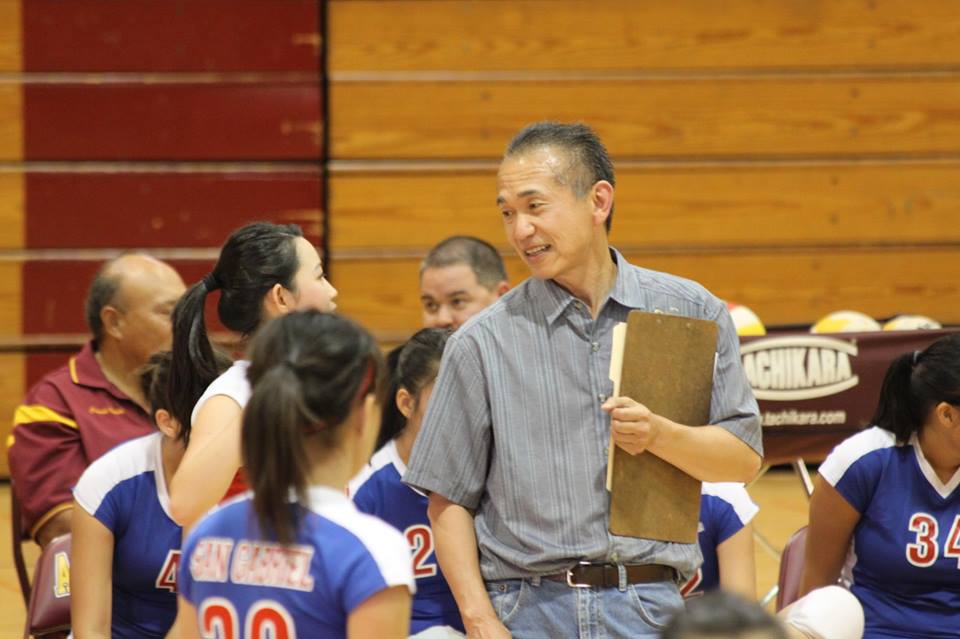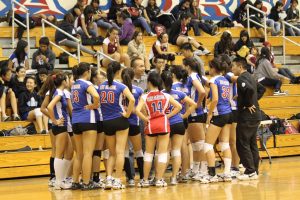
Photo courtesy of Chris Kwan
The Art of Coaching: San Gabriel on effective leadership

Coaches’ Perspective
Focus, guidance, leadership, conditioning, and development are words that best describe what a good coach should be.
Larry Kanow, retired San Gabriel High School (SGHS) volleyball coach, shares his thoughts on how sports make an impact toward the students.
“In high school, sports are a way for students to connect with each other and to learn the value of working towards a common goal,” Kanow said. “Students need a ‘buy in’ to help them feel a part of their school. For some its debate, publications, dance, drama, clubs, student government etc, while for others it’s athletics.”
Grand Canyon University’s head coach of the men’s ice hockey team, Daniel Roy, says that a good coach is capable of inspiring and allowing their players to grow into adults.
“A good coach is someone who develops, not just the athletic abilities, but also develops the students themselves and prepares them for life,” Roy said. “I think when you coach like that […] and [the athletes] buy into that kind of philosophy, then you’ll get a really good product on the playing field.”
SGHS co-ed swim varsity coach, Andre Flores, says that planning for the future and training like a championship team is effective for being a formidable coach.
“For swim, a good coach knows how to condition their team as well as how to work with swimmers to their strengths rather than a cookie cutter method of training everyone the exact same way,” Flores said.
Drawing from his own experience as an athlete, Flores enhances the quality of his coaching because he can emphasize with his swimmers’ struggles.
“Coaching impacts me on a personal level because to be able to guide some of these swimmers that I can very easily relate to is very moving for me,” Flores said. “It motivates me to push them to perform their best because I see myself having started where most of them are right now.”
Not only do coaches need the right attitude to be successful for themselves, they also need to provide the motivation that their athletes need to strive throughout the season. SGHS boys football varsity coach Kevin Encinas says that he faces the challenge of getting his players to believe that they are capable of great things.
“The best way to work through these issues is to show them a clear path to success,” Encinas said. “One of the best ways to show them is through objective measurable data. I do this by showing my players data from their weightlifting numbers at the start of the off-season program.”
With good coaches, comes solid principles. Roy shares some rules that they as coaches set up for their players in order to create solutions for possible problems.
“There’s no whining, complaining, or excuses,” Roy said. “I try to live by the fact that if that’s the rules that we expect our players to live by, us as coaches as well have to also do that. Otherwise our players are going to look at us and go, ‘What makes you so special that you also don’t have to do it?’”
Student-athletes’ Perspective
Coming from a student athlete’s perspective, players do not necessarily favor a lenient coach. Junior Cynthia Abuede says that she prefers a coach that teaches principles not only in sports, but also outside of school.
“[These principles] will help you in the long run, like how to participate with others, how to work even though you don’t want to work, how to push yourself individually,” Abuede said.
Abuede also elaborates on how her previous volleyball coach, Kanow, benefitted her with that mindset.
“He was always there to provide wisdom and say, ‘This is what you have to do, A, B, and C, and if not, you could run,’” Abuede said. “So it’s not necessarily an ultimatum, it’s [more like to] do your job and don’t be disrespectful.”
Throughout the year or season, a coach builds memorable bonds and improves the team’s chemistry. Along with this, senior Janelle Cabrera says that the ideal coach should show leadership, keep up with the student athlete’s academics, and reassure them to constantly work hard. Cabrera says she struggles to find that kind of offering from coaches due to the fact that she has had an inconsistent cycle of different coaches throughout her four years.
“Personally, I feel like [inconsistency] has an impact on the [team],” Cabrera said. “You’re making a bond with a coach for a whole year or a whole season and then to find that the next year you don’t have the same coach, it really changes the vibe and makes people not want to join sports.”
Coaching Controversies at SGHS
SGHS has had multiple issues revolving around the coaches. Student-athletes have complained about the loss of their successful volleyball coaches or made complaints about being unreasonably disciplined by their coaches. Matthew Dultz, the Assistant Principal of Business and Activities, says that it is difficult to find quality coaches that have a combination of qualifications such as coaching experience, knowledge of the sport, and the commitment to run a quality program.
“It is very frustrating because I want to see all of our programs develop and succeed under the guidance of good coaches,” Dultz said. “Unfortunately, some [coaches] may look good on paper, but when the spotlight is on them, [they] cannot handle the pressure and responsibilities involved with being in charge of a high school athletics program.”
Abuede shares her opinion on how the coaching complications at SGHS have affected her, using her coaches, Kanow, Chris Kwan, and Lyle Honda as examples.
“For volleyball, I felt it wasn’t just due to the fact that [Kwan] and Kanow have dedicated so much of their lives to this school specifically and provided us with many championships for years to come,” Abuede said. “I felt that their work was disrespected when [Kwan was] let go just like that. As for basketball, I know it was Honda’s time to go and I respect his decision.”
In addition to the effort of the coaches and athletes, Kanow says that athletics programs must also have the backing of the school in order to thrive.
“All the top high schools have well attended and consistent extra-curricular programs with support from the administration,” Kanow said.
Abuede says that the problem is that the school does not “trust the process at times,” which is why they find themselves in a difficult situation with coaches. However, she expects to be more grateful for any coach they may get, knowing the difficulty in acquiring one.
Rewards of Coaching
Despite the negativity against coaches, there are reasons as to why these coaches chose to do what they do. Roy explains how coaching can be both stressful yet very enjoyable at times.
“It’s one of those careers that you choose because you love it,” Roy said. “You choose to coach, you’re not going to make the big money. It’s one of those things you do because you love helping grow the game. You love helping athletes get better and aim for their goals or at least hit a goal they didn’t know they could get to.”
Likewise, Kanow says that coaching is very worthwhile and that its rewards outweigh the work and commitment that the job demands.
“Coaching, advising, and teaching all have a lot in common in that you are privileged to work with passionate, hard working, and enthusiastic young people which is the trade-off for the pay and hours involved,” Kanow said.
Overall, a good coach should require the skills to push players on their athletic abilities, show their true capabilities, build up their confidence or motivation, and most importantly, prepare them for life.